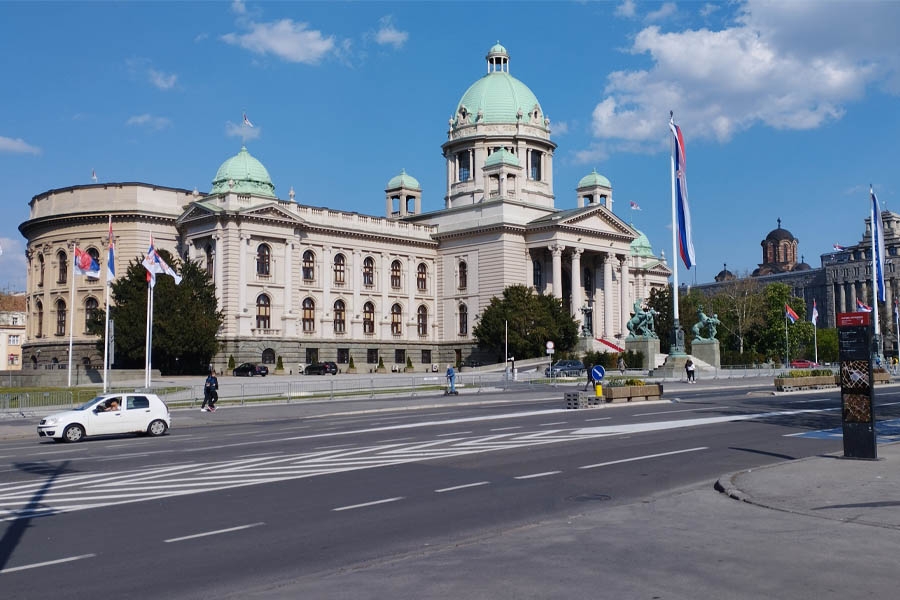Demostat sources claim that the last session of the current term of the Republic Parliament could be held "possibly by the end of September," but considering the techniques used by the government aligned with the Progressive Party so far, one should not exclude the scenario in which the elections will take place in the spring of 2024 instead of the last month of 2023.
Technically speaking, the dates speculated by pro-government media regarding the voting date refer to the second decade of December (mentioning December 10, 17, and 24), which is still far away.

Demostat sources claim that the last session of the current term of the Republic Parliament could be held "possibly by the end of September," but considering the techniques used by the government aligned with the Progressive Party so far, one should not exclude the scenario in which the elections will take place in the spring of 2024 instead of the last month of 2023.
Technically speaking, the dates speculated by pro-government media regarding the voting date refer to the second decade of December (mentioning December 10, 17, and 24), which is still far away.

The coordinators of the Serbian Progressive Party have already received instructions to prepare for parliamentary and city assembly elections in Belgrade in December, unofficially learned by Demostat from sources in the political scene of Serbia. These sources comment on the frequent media claims that the last month of this year is the most likely deadline for the new voting. However, our interviewees note that the practice of issuing instructions to the SNS committees to "be prepared" for elections is applied several times a year, for the past decade, so it should not be excluded that the vote may take place a few months later, in the spring of 2024.
As our sources specify, the leader of the Progressive Party in the Republic Parliament, Milenko Jovanov, stated at this weeks session of the parliamentary club of the largest ruling party that elections for the National Assembly and the new city assembly in Belgrade will be held in December, and that "only one more session of the National Assembly in this term will be convened."
It is claimed that this last session of the current term of the Republic Parliament will be held "possibly by the end of September." Although there were speculations from the ranks of the Progressives and their affiliated media this summer about the possibility of raising the electoral threshold from the current three to the previous five percent, Demostat sources claim that the top leadership of the SNS "does not mention it for now," while experts point out that there probably would not be time for such a decision, provided that a new vote is held in December.
Milenko Jovanov, on Tuesday, September 5th, after part of the opposition disrupted the work of the National Assembly with whistles, told the media that the President of the Assembly, Vladimir Orlic, had informed the opposition that there would be elections, but that there is a procedure, and it will probably take a few weeks, and that the opposition will get what it asked for. "The Serbian Progressive Party (SNS) wishes for elections," Jovanov stated. It should be noted that some opposition MPs announced on Tuesday that they had decided to block the Assembly and call for new elections because their demands from the "Serbia against violence" protests had not been met even after four months. These protests began to organize in Belgrade and across Serbia after two mass murders in May.
As it is claimed, "the opposition believes it can defeat the government in the elections in Belgrade." It is worth mentioning that in April of the previous year, Vu?i? met with the leader of the Freedom and Justice Party, Dragan Djilas. These talks took place on April 11th, 2022, just eight days after the presidential, parliamentary, and Belgrade elections had concluded. At that time, Djilas stated in a media interview that the conversation had been difficult and that he had reiterated his demand for new elections in Belgrade to legitimize the government. Speaking about the meeting, Vucic said, "If the strongest opposition list believes we should have early city elections, we will go for it. I think at least six months should pass, but if they insist, we can do it earlier." However, in the meantime (in June of the previous year), the city government was formed with the SNS as the main party, and Aleksandar Sapic became the mayor. In November 2022, a vote was held in the Belgrade City Assembly to dismiss Sapic, but the proposal was not adopted because 44 out of a total of 110 councilors voted in favor of his removal.
The fact that Aleksandar Vucic did not adhere to the agreed timing for the elections for the city assembly in Belgrade last year, and his previous habit of announcing certain moves and then either abandoning them or implementing them after a shorter or longer delay, shows that its possible that the elections may not take place in December. Additionally, Prime Minister Ana Brnabic, following the largest protest by a portion of the opposition and dissatisfied citizens organized in early June in the capital as part of the "Serbia against violence" protests, stated that her "resignation is on the table," yet she remains at the helm of the government. Therefore, based on the governments past experiences and techniques led by the Progressive Party, embodied in Aleksandar Vucic, it should not be excluded that they may delay calling elections at various levels until spring. In the current circumstances, there are no solid guarantees for the opposition that the elections will indeed take place in December because representatives of the SNS who are talking about the last month of this year as the timing for the elections can change their rhetoric overnight. Furthermore, technically speaking, the dates being mentioned by pro-government media regarding the voting date refer to the second decade of December (mentioning December 10, 17, and 24), which is still far away (there are still a hundred days until then).
According to the current Law on the National Assembly, the deadlines for early parliamentary elections are the same as for regular ones. This means that from the day the elections are announced to the day of voting, no less than 45 days and no more than 60 days can pass. These elections are called by the President of the Republic of Serbia (in this case, Aleksandar Vucic). Parliamentary elections in Serbia are conducted as a single electoral unit, with voters casting their votes for party lists using a proportional representation system, which distributes parliamentary seats in proportion to the number of votes each electoral list receives. These elections are administered by the Republic Electoral Commission, whose term lasts for four years, and polling boards are formed for each election separately. A maximum of 250 candidates can be included on an electoral list, which is the same number as the number of deputies to be elected.
As for the elections for the Belgrade City Assembly, they are called by the President of the National Assembly (in this case, Vladimir Orlic). The mayor is not directly elected by citizens but is chosen by the City Assembly through a secret vote by the majority of the total number of councilors. The candidate for mayor is proposed by the President of the City Assembly. Local elections in Belgrade are administered by the City Electoral Commission. Like parliamentary elections, there must be a minimum of 45 days and a maximum of 60 days between the announcement of the local elections and the actual voting day. The Belgrade City Assembly has 110 councilors.
Published on September 6th, 2023
In all societies there are issues that are rather being skipped. Certain...
The neoliberal path, started in 2001, has led to especially bad results in Serbi...
For centuries, the region was subsumed within the Ottoman and Hungarian Empires,...
"Serbia has returned to the systemic and anti-systemic position of the political...
In reality, Serbia is closer than ever to NATO. In the course of the last five y...